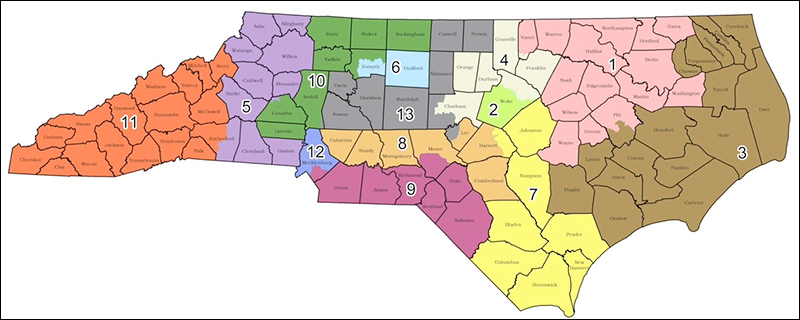By Jim Ellis
May 10, 2022
House
GA-6: Trump Endorses Jake Evans — Former President Donald Trump announced his endorsement of former Georgia Ethics Commission chairman Jake Evans for the open 6th Congressional District primary scheduled for May 24. Trump joins former House Speaker Newt Gingrich (R-GA) in supporting Evans among others. The early leader appeared to be Dr. Rich McCormick (R) who challenged current Rep. Carolyn Bourdeaux (D-Suwanee) in the neighboring 7th District, but lost a close 51-49 percent battle in 2020. The new 6th was made highly Republican, R+24 according to the FiveThirtyEight data organization, hence the reason current 6th District incumbent Lucy McBath (D-Marietta) decided to challenge Rep. Bourdeaux in the 2022 Democratic primary.A total of nine Republican candidates are vying for the party nomination, but it will likely come down to a battle between McCormick and Evans. The chances of these two advancing to a July 26 runoff election are high. Georgia employs a 50 percent threshold to claim a nomination outright. If no one reaches that percentage plateau, the top two finishers then face each other in a succeeding runoff election.
GA-14: Rep. Marjorie Taylor Greene Wins Judicial Ruling — Rep. Marjorie Taylor Greene (R-Rome) was cleared of insurrection charges, and subsequently awarded a ballot position as she seeks a second term in the House. Left of center forces were challenging Greene’s status because of what they said was her role in the Jan. 6 US Capitol protest.
Greene faces five Republican primary opponents on May 24. The likely Democratic nominee is Army veteran Marcus Flowers who had raised over $7 million for the contest, but showed only $1.9 million remaining in his account on March 31. Flowers will need all of these funds and then some, since the new GA-14 is rated R+45.
NY-19: State Senator Won’t Run for Congress — Rep. Antonio Delgado’s (D-Rhinebeck) appointment as New York’s lieutenant governor leaves the upstate 19th Congressional District as an open seat. State Sen. Michelle Hinchey (D-Kingston), daughter of the late US Rep. Maurice Hinchey (D) who served 10 terms in the House, had been considering a congressional bid but announced on Friday that she would instead seek re-election to the legislature. This perhaps robs the Democrats of their best potential candidate in a district that could be re-drawn as more favorable to the Republicans when the new maps are completed by the assigned May 20 deadline.
NC-4: State Senator Leads Dem Open Seat Field — Veteran Tar Heel State US Rep. David Price (D-Chapel Hill) is retiring after serving what will be 34 non-consecutive years in the House. The battle to replace him comes in the Democratic primary in what is rated as a new D+30 district that contains the cities of Durham, Chapel Hill, and Burlington. An Impact Research survey (April 25-28; 425 NC-4 likely Democratic primary voters; live interview) projects state Sen. Valerie Foushee (D-Chapel Hill) as the race leader with 35 percent support. Durham County Commissioner Nida Allam is second with 16 percent preference, and country singer and former congressional candidate Clay Aiken is third with 10 percent.
Under North Carolina election procedure, a candidate must receive at least 30 percent of the vote to win a partisan nomination outright. It appears that Sen. Foushee is in position to win the May 17 Democratic primary, which is tantamount to clinching the general election in this district.
WV-2: Independent Poll Casts Mooney as Leader — There has been a large number of public polls released in this intra-party incumbent pairing contest, the first of five such battles to be conducted around the country this year. Almost all of the polls, however, have been internally commissioned and show the poll sponsor leading.
The new Research America poll was conducted for the West Virginia MetroNews and not one of the candidates (April 27-5/4; 350 likely WV-2 GOP primary voters; live interview & text), but the results largely confirm the Public Opinion Strategies survey that Rep. Alex Mooney’s (R-Charles Town) campaign released last week. The RA poll finds Mooney leading fellow US Rep. David McKinley (R-Wheeling) by a 48-33 percent count. The POS result posted Rep. Mooney to a similar 50-30 percent lead. The West Virginia primary is today.





 By Jim Ellis
By Jim Ellis